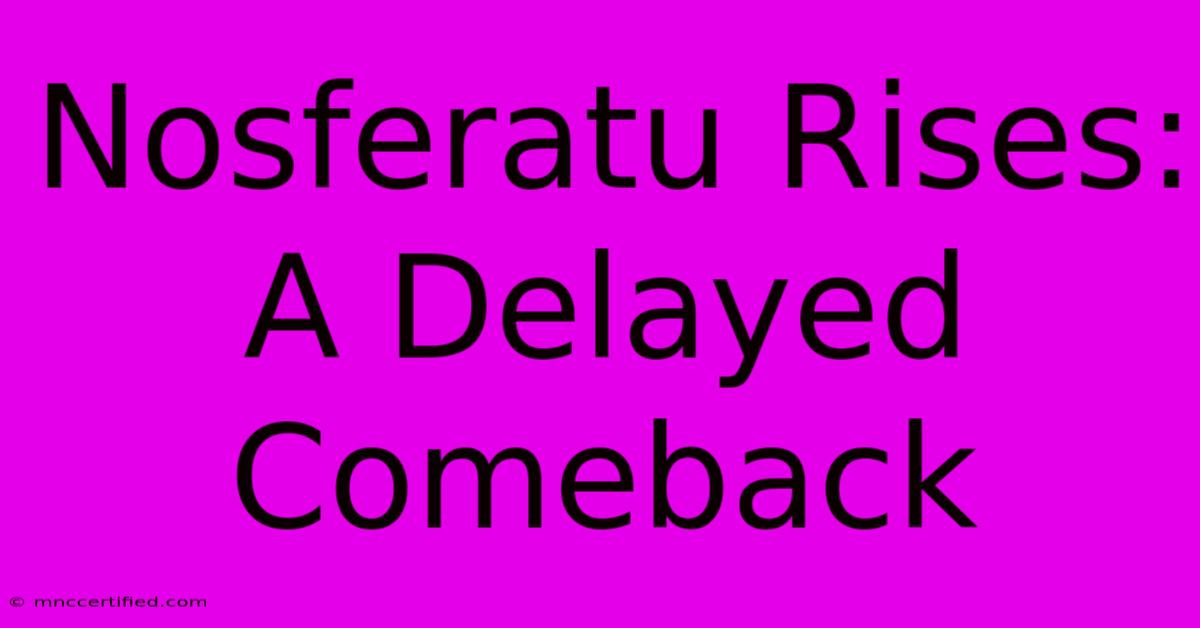Nosferatu Rises: A Delayed Comeback

Table of Contents
Nosferatu Rises: A Delayed Comeback
The enduring legacy of F.W. Murnau's 1922 silent horror masterpiece, Nosferatu, eine Symphonie des Grauens (Nosferatu, a Symphony of Horror), is undeniable. Its influence on vampire cinema is immeasurable, yet its complicated history – marked by copyright infringement and subsequent legal battles – has also contributed to its mystique. This article delves into the film's turbulent past, its unexpected resurgence in popularity, and the reasons behind its continued relevance in the modern era.
A Shadowy History: Copyright and Controversy
Murnau's Nosferatu wasn't simply an adaptation of Bram Stoker's Dracula; it was a blatant, unauthorized appropriation. This act of cinematic piracy resulted in a court order to destroy all existing prints of the film. Ironically, this near-total annihilation only served to heighten its legendary status. A few surviving copies remained, ensuring the film's eventual rediscovery and appreciation by future generations of filmmakers and audiences. This initial controversy, however, contributed significantly to the film's delayed comeback and cult following.
The Rise of the "Lost Film" Phenomenon
The scarcity of Nosferatu prints fueled a sense of mystery and intrigue around the film. It became a coveted artifact, a "lost film" that only added to its already chilling atmosphere. The fragmented nature of its survival, with incomplete or damaged reels existing in various archives, added to its legendary status. Its eventual restoration and wider distribution became a significant cultural event, cementing its place in cinematic history.
Re-emergence and Lasting Influence
Despite the initial legal setbacks, Nosferatu eventually enjoyed a delayed but remarkable resurgence. The film's striking visuals, Max Schreck's unforgettable performance as Count Orlok, and Murnau's innovative cinematic techniques—including expressionistic lighting and camera angles—proved timeless and highly influential.
Modern Appreciation: Beyond the Horror Genre
Nosferatu's influence extends far beyond the horror genre. Its expressionistic style has been emulated countless times in cinema, and its thematic exploration of alienation, disease, and the seductive nature of evil remains profoundly relevant. The film's imagery continues to inspire artists, filmmakers, and musicians, testifying to its enduring cultural impact. Its symbolic power, particularly its representation of the outsider and the anxieties of a rapidly changing world, speaks to contemporary audiences on a deep level.
The "Nosferatu" Effect: A Lasting Legacy
The term "Nosferatu effect" has emerged to describe the film's lasting influence on vampire portrayals. Count Orlok's gaunt visage, elongated fingers, and unsettling movements have become iconic representations of the vampire archetype, shaping how we visualize vampires in popular culture even today. From countless films and novels to video games and artwork, the shadow of Nosferatu remains.
The Future of Nosferatu: A Continuing Legacy
While the original Nosferatu remains a cinematic landmark, its legacy continues to evolve. Numerous remakes, reimaginings, and homages have been created over the years, demonstrating its enduring appeal and its capacity to be reinterpreted for new audiences. This adaptability, coupled with its original artistic merit, ensures that Nosferatu will continue to rise from the shadows for many years to come. Its delayed comeback was not just a rediscovery; it was a testament to the power of cinematic artistry and the enduring appeal of a truly unforgettable horror story.
Keywords: Nosferatu, Nosferatu eine Symphonie des Grauens, F.W. Murnau, Max Schreck, silent film, German Expressionism, vampire movie, horror film, cinematic legacy, copyright infringement, film restoration, cultural impact, Nosferatu effect, Dracula, Bram Stoker, expressionistic cinema, lasting influence, delayed comeback, cinematic artistry.

Thank you for visiting our website wich cover about Nosferatu Rises: A Delayed Comeback. We hope the information provided has been useful to you. Feel free to contact us if you have any questions or need further assistance. See you next time and dont miss to bookmark.
Featured Posts
-
Konstas Top Order Shine Day 1 Recap
Dec 26, 2024
-
Zay Flowers Active Vs Texans
Dec 26, 2024
-
Knicks Beat Spurs 117 114 Christmas Day
Dec 26, 2024
-
Netflix Beyonces Halftime Show Review
Dec 26, 2024
-
Billy Monger Strictly Christmas Contestant
Dec 26, 2024